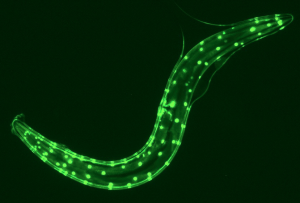Whenever somebody asks me what I do for research, I always reply, “I’m killing worms” or “I’m torturing worms” just to see what sort of reaction I incite before I explain the driving purpose behind my lab in further detail. It’s much more complex than that, I say afterwards, and as I explain, I always take great satisfaction in the way people’s facial expressions morph from dubious to understanding.
I’ve experienced a similar transformation after spending a week in the Baugh lab learning new lab techniques, meeting new people, and reading plenty of scientific papers. The Baugh lab is a c. elegans lab that observes developmental arrest (L1 arrest) in roundworms with various mutations under starvation to elucidate signaling pathways and gene regulatory mechanisms that control this arrest. These pathways and mechanisms mirror those of humans, and this research can be used to study the maintenance of homeostasis during development (adaptiveness), aging, and even cancer cell division and growth.
As intriguing as the concept behind the lab is, I admittedly came back to Duke this summer to begin my first foray into scientific research with a great deal of apprehension. How would I feel about working with nearly microscopic worms for an entire 8 weeks? How much of the jargon-filled papers that I was supposed to read before starting lab was I supposed to understand? What if I turned out to be utterly incompetent and unreliable? What if I couldn’t deal with the long working hours?
Although I went into lab at first prepared to take on the worst if necessary, I ended up leaving lab each day with a new insightful, eye-opening experience. I was amazed at the way my mentor and others in the lab worked with adept efficiency and the way they casually inserted scientific jargon into their conversations with no trouble at all. I appreciated the patience my mentor displayed when I made a careless mistake, her thorough and informative responses to my frequent questions, and her willingness to take me on as a mentee even though she was plenty busy already with her own projects. I also realized after witnessing several moments of camaraderie (mostly in the form of shared anecdotes or sometimes scientific puns) that the atmosphere of the lab doesn’t have to be stiff and formal as people might expect of a place where ground-breaking research is being conducted.
I was also pleasantly surprised by how much I actually enjoyed working with worms, whether it was viewing them under a fluorescence microscope for the first time to score cells (picture below because I think it looks cool) or transferring them painstakingly from plate to plate when performing biweekly strain maintenance. More than anything this week, I particularly enjoyed the growth I personally experienced while in the lab, whether it was performing repeated techniques with more finesse each time, being able to navigate the lab more freely without supervision, reading literature with more ease, or simply becoming more knowledgeable about my personal project and the lab’s overarching purpose.

Of course, I still have quite a ways to go, but I have many expectations for these coming weeks. Although I have gotten relatively lucky this past week with making only minor mistakes in lab, I expect that many more mistakes will likely be made in the future, and while they’re likely inevitable, I hope to at the very least learn from them and prevent them from occurring again. I am also making it my goal to become as familiar as possible with my personal project in my lab and read plenty of literature regarding the two specific genes I was put in charge of testing. One of the most thrilling moments of the week for me happened when both my PI and my personal mentor told me that they both know very little regarding the genes for my project, so it’s completely uncharted territory for them, and it’ll be my job to become an “expert” on the genes. More than anything, I expect to transition from being almost totally dependent on my mentor to becoming more independent and able to carry my own weight by the end of the summer.
With that, I look forward to the great experiences the rest of the summer will provide, and I wish my fellow B-SURF fellows (pun not intended) the best of luck with their own projects!
